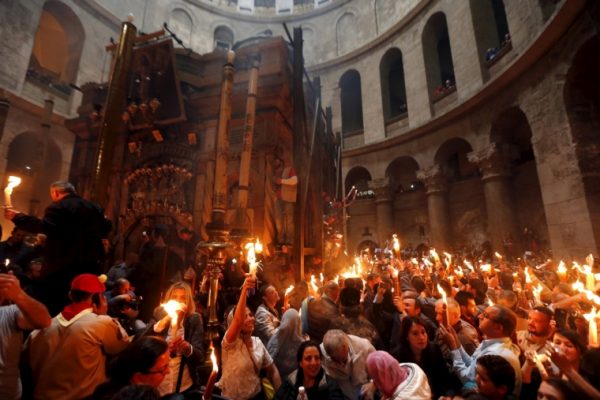I suspect that many Orthodox have shared the experience of inviting friends to the Paschal service only to be met with polite but stunned surprise: “Would you like to join us for Pascha this year at our church?” “Sure. Sounds like fun. What time do you meet?” “The service begins on Saturday, at 11.30 p.m.” The sharing of this information is usually followed by a moment of silence. Then: “Sorry—what time? 11.30 p.m.?” The person is usually too polite to say it, but you can tell they are thinking, “What kind of lunatic meets for church at 11.30 p.m.? Are you crazy?” They were expecting us to say something like, “We meet on Sunday morning at 11.30 a.m.”, and would even understand if we invited them to a sunrise service. A sunrise service would be a bit demanding, but it would at least be held during daylight hours. But what kind of nut meets for church around midnight? Why would anyone do this?
There are two reasons, neither of them involving mental illness on the part of the Orthodox.
First of all, there is the liturgical reason. A principle of Orthodox liturgics is that the more important the service, the earlier it is. Receiving the Eucharist on Lenten weekdays is important, but it can wait until the evening. The weekly Sunday Liturgy is more important, and so it is held in the late morning, after a night’s rest. But Pascha is something else entirely. Pascha is so important that it is not even numbered among the Church’s Twelve Great Feasts. Pascha is the source of all the feasts, and of all our spiritual life. It is so important that the moment Saturday becomes Sunday and Pascha arrives (i.e. at midnight) we have the service. It is as if, like children, we so excited that we can’t wait a moment longer: as soon as it is Sunday, we meet to celebrate and to cry, “Christ is risen!”
The second reason is spiritual. We insist on meeting when the darkness of night is deepest because we live in a world of deep darkness, and our task in this world is to illuminate the darkness with the light of Christ. It is as Isaiah foretold: “Behold, darkness shall cover the earth, and thick darkness the peoples” (Isaiah 60:2). The world is indeed dark, and growing darker. The persecution against Christians rages ever more strongly throughout the world (mostly unreported, due to the media blackout of such things on the part of the western journalists), and the world lies shrouded in the moonless night of sin (to quote from the Holy Week “Hymn of Kassia”). Sin blinds the eyes of the world, which delights to call evil good and good evil, which put darkness for light and light for darkness (Isaiah 5:20). Thick darkness indeed!
Yet in the midst of this darkness, we are called by God to shine with the light of Christ. Isaiah said so: “Arise, shine, for your light has come, and the glory of the Lord has risen upon you!” St. Paul said so too, paraphrasing and interpreting Isaiah’s words for his Ephesian converts: “Awake, sleeper, and arise from the dead, and Christ shall give you light!” (Ephesians 5:14). Isaiah and Paul were both talking about Christ, and baptism, and Pascha. In baptism, Christ shines His light into the darkened human heart, and through us illumines the world. That is why Isaiah went on to say that after the glory of the Lord had risen upon us, nations would come to our light and kings to the brightness of our rising (Isaiah 60:3). And that is why we insist on shining and singing in the midst of the deep darkness of midnight—to reveal the only source of light found in this dark world.
We meet to sing in the middle of the night, therefore, not because we are lunatics, but because in a midst of a dark world gone mad, we are the source of sanity and light. By lighting our candles and piercing the midnight air with a hymn of triumph and praise, we reveal that Christ can illumine the darkness of the world with the light of joy. The thick darkness which covers the peoples is not only the darkness of sin, it is also the darkness of despair. But none need despair. In Christ, we defy darkness and despair, and sing for joy. Come and receive light from the unfading light, and glorify Christ who arose from the dead! Christ is risen!

















